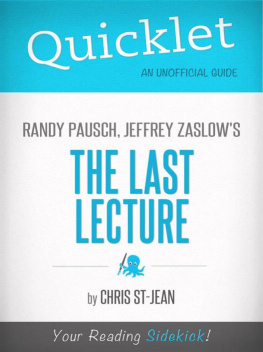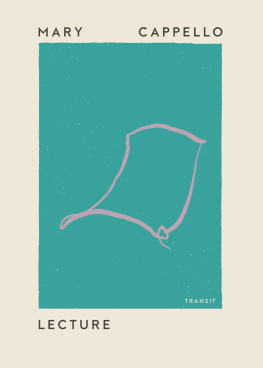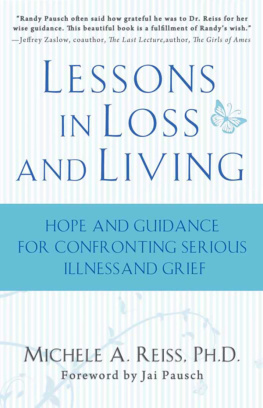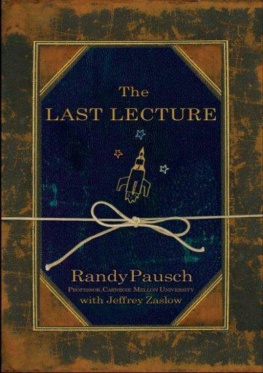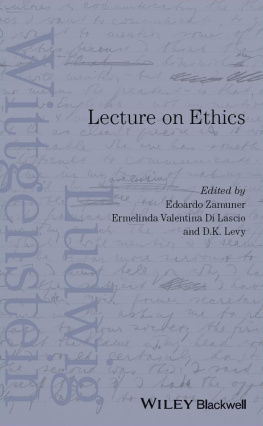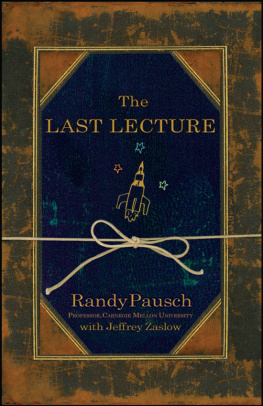Quicklet On Randy Pausch & Jeffrey Zaslow's The Last Lecture
Randy Pausch An Ordinary Inspiration
Id stumbled upon Randy Pausch, a youngish professor from Carnegie Mellon University, quite by accident in 2011. Id been looking for a good PowerPoint presentation about time management, and the one he gave was deemed to be really interesting, according to the Google searches Id done.
As I read the mini-bio attached to the file, it occurred to me that Id heard the name before, so I did some further searching and realized he had written The Last Lecture, which Id heard so much about a few years ago. I immediately headed out and picked up a copy.
As I read, I was stunned by the powerful simplicity of his writing. I had already watched The Last Lecture on YouTube, as millions had during the time in which the presentation had gone viral, but I was surprised at the profound effect the book had on me. This was a man who, by all accounts, had everything going for him: a great job that he loved, three very young children and a beautiful wife whom he adored.
To be taken out at the knees by a fatal cancer diagnosis at the age of 41 would have been devastating, and while Im sure he had his moments when he cried and was mad at the world for such a tragic turn of events, he seemed to have become more determined to live and show his family if not the world which was now watching how to live as well.
Its a heck of a thing to learn about time management from someone who doesnt have much time left, but Randy Pausch, who died at an age not much older than I am now with kids roughly the same age as my own, taught me a lot about grace and moving on in spite of impossible news.
I refer to him frequently when I teach my business classes, or when I need to help my students look for hope when everything seems hopeless. He may have intended on keeping his lecture strictly for Carnegie Mellon students, and Im sure his widow looks at the video of that lecture from time to time even now, but his is a lecture that has taught millions and will continue to inspire.
About the Author
Randy Pausch was a professor and all-round computer whiz at Carnegie Mellon University in Pittsburgh, Pennsylvania. Born October 23, 1960 in Baltimore, Maryland, Pausch had a longtime interest in computers and technology, going on to receive his bachelors degree in Computer Science from Brown University on Rhode Island and then his PhD in Computer Science from the university that became his professional home, Carnegie Mellon.
In late 2006, Pausch was diagnosed with pancreatic cancer and given three to six months of good health left. Coincidentally, Carnegie Mellon had adopted the idea of the last lecture that many universities had offered to their faculty; the professor would consider what life lessons they could impart to their students that wouldnt necessarily be included on a course syllabus.
No one expected that for Pausch, it would possibly be his last lecture. A month after he and his wife Jai learned that his cancer was terminal, he gave The Last Lecture: Really Achieving Your Childhood Dreams to a packed auditorium of students and faculty at Carnegie Mellon. The lecture was recorded and placed on YouTube, and promptly went viral, going on to score some 13 million views and counting as of 2012.
Roughly eight months after that lecture, the book The Last Lecture was published by Hyperion Press. Pausch admitted he wasnt too concerned as to the numbers of copies the book would sell; the only three copies that mattered to him were the copies that were going to be saved for his three very young children. He also admitted one of his greatest joys was that he was able to include the name of his alma mater and current employer Carnegie Mellon on the front cover.
As happens to some 33,000 Americans every year, Pausch lost his battle with pancreatic cancer July 25, 2008. His lecture lives on, however; the video and audio recordings continue to receive hits on the internet and his book, co-authored with Jeffrey Zaslow of the Wall Street Journal , graces the shelves of bookstores everywhere.
Jeffrey Zaslow , who, like Pausch, was a Carnegie Mellon graduate, was a longtime columnist for the Wall Street Journal . He wrote on topics ranging from the anguish of losing his car in the Disneyworld parking lot to a fathers powerful influence on his daughters. It was his last-minute decision to drive five hours to listen to a dying Carnegie Mellon computer science professor, however, that would have a lasting impact on him.
He often said that he was glad he decided to attend the lecture, and described the atmosphere in the packed auditorium as electric. He became a vicarious member of the Pausch family over the course of 53 days working with Pausch on the book version of The Last Lecture, according to Pauschs sister Tamara Pausch Mason, and stayed in close contact with the family after her brother died.
Zaslow also collaborated with Arizona Rep. Gabrielle Giffords and her husband Mark Kelly to tell her tale of courage in Gabby: a Story of Courage and Hope, which describes the aftermath of her injuries after being shot at point-blank range in the head. He also wrote Highest Duty , about airline Captain Chelsey Sullenburger, who successfully executed a water landing with a jetliner on the Hudson River in New York.
Zaslow died February 10, 2012 after losing control of his vehicle in a Michigan car crash. He was 53.
The Last Lecture in Context
It was only about three and a half years ago that a young Carnegie Mellon professor named Randy Pausch gave what ended up being the lecture of a lifetime. It was, certainly, one of his crowning achievements, but if anyone had said to him that he would have gone from relative anonymity to worldwide acclaim, he may have simply smiled or had a good laugh.
At the time he was approached to participate in the last lecture series, Pausch was the picture of health cheerful, unfailingly optimistic and looking every inch like he possibly just breezed in from an afternoon jog. In fact, within minutes of starting his lecture, hed dropped to the ground and cracked off a handful of quick pushups.
He was, however, in the beginning stages of the fight of his life; hed undergone a Whipple procedure to potentially extend his life after his pancreatic cancer diagnosis in 2006, but learned in August 2007 his cancer had returned with a vengeance, tumors peppering his liver and spleen, leaving him with palliative chemotherapy as an option to buy some time.
He gave the lecture in September 2007 and recorded it for his kids and students who may have missed the opportunity to attend. He didnt anticipate the worldwide response that followed.
But the lecture did gain worldwide attention, and in a decade gripped by war and hysteria in the aftermath of the attacks on the World Trade Center in the previous decade, Pauschs simple instructions on how to seize the day and live fully resonated with many over 13 million people, to be exact.
If anything, The Last Lecture showed to the world just how pervasive media attention is today; after the lecture itself became a YouTube sensation, Pausch made appearances on The Oprah Winfrey Show and Prime Time Live with Diane Sawyer, in addition to appearing on Times Top 100 list of the worlds most influential people for 2008.
He drew the attention of Katie Couric, The Wall Street Journal s Jeffrey Zaslow, director J.J. Abrams, and none other than Captain Kirk himself, William Shatner. He testified before Congress to encourage more funding to be directed to pancreatic cancer research and received a letter from the original President Bush.
He continued to receive requests for media appearances, deciding to use what he termed his D-list celebrity status for the best good possible. Pauschs decision to do this was in the same era as Michael J. Foxs stand regarding Parkinsons Disease, and actor Patrick Swayzes Stage IV pancreatic cancer diagnosis followed four months after Pausch took the stage at Carnegie Mellon for his last lecture.

